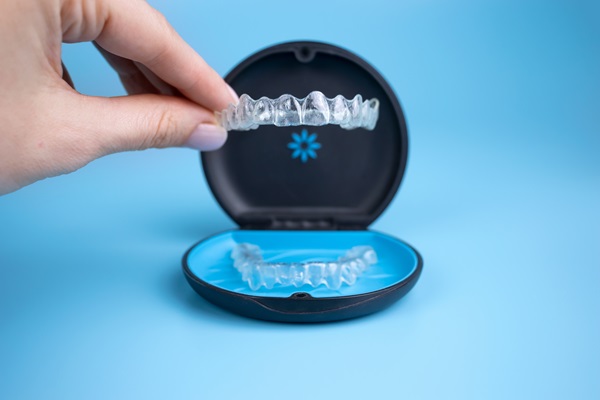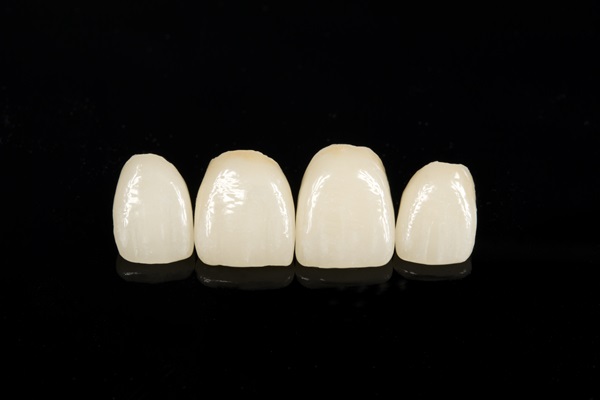What Dental Issues Does Invisalign Treat?

Using custom-fit plastic trays, Invisalign® treatments are a restorative and corrective treatment for several dental problems. As an orthodontic solution, clear aligners are often compared to a treatment using metal braces. Corrective measures typically address crooked or misaligned teeth, and provided the patient wears the trays for the prescribed length of time, the results are similar to traditional braces. However, these aligners are often considered to provide results sooner and with less discomfort.
Dental conditions that can be addressed through aligners
When looking into orthodontic solutions, aligners may be a clear choice over traditional metal braces. While it depends on the cosmetic goals and specific bite issues, there are some conditions where aligners are an ideal choice for treatment.
Misaligned teeth
Teeth that are out of line can make it difficult to chew and cause embarrassment when smiling. Clear trays will put pressure on the teeth that are lying along the outside of the jaw to restore them to a uniform position along the jawline. The condition of the misalignments impacts the treatment plan, but patients can expect to wear the trays for six months to a year.
Crowded or crooked teeth
Even though there is a difference between teeth that are crooked and crowded, the impact on one’s confidence and appearance are the same. Clear trays provide an inconspicuous treatment plan to turn the teeth and create more room for a beautiful, straight smile. Treatment can range from six months to a year before optimum results are achieved.
Bite problems
There are several bite conditions that clear aligner trays can address, including an overbite, underbite, crossbite, and open bite. These conditions impact the way the teeth align and come together within the mouth. These bites affect the ability to eat and speak and often lead to discomfort and pain if left unaddressed. Within just a few months, patients with minor bite problems can find relief and corrective help with aligners.
Orthodontic conditions that require an alternate solution
Dental health specialists often recommend Invisalign® treatments because of the effectiveness and efficiency of the corrective process, but there are some conditions that may require more specialized treatment. Though aligners are successful in straightening crooked teeth, severely rotated teeth will require more individual attention through specialized equipment. Large gaps between the teeth may require crowns, veneers, or composite bonding, with some spaces needing bridgework or implants to address the gap.
In some cases, the patient’s oral condition may not work well with the design and process of clear aligners. A severe overbite may not see the same successful results when compared to traditional braces. If a patient deals with extrusion or intrusion, the process is not able to lower or raise the position of the teeth enough to correct the problem. Additionally, teeth that are too short or pegged can keep the trays from having a good fit and working correctly.
Conclusion
Though Invisalign® treatments can address many orthodontic problems, check with a dentist about possible limitations. Treatment is only effective when properly prescribed to address a specific condition.
Request an appointment here: https://easthanoverfamilydental.com or call East Hanover Family Dental at (973) 302-2078 for an appointment in our East Hanover office.
Check out what others are saying about our dental services on Yelp: Invisalign in East Hanover, NJ.
Related Posts
Invisalign® aligners are one of the options you might encounter if you are considering teeth straightening. It is a significant step that could ensure lifelong confidence and a healthy oral cavity. Away with the metal braces that use brackets and wires, Invisalign aligner uses a system of transparent plastic trays to straighten the teeth, removing…
Dentists commonly recommend dental crowns to protect teeth that have become structurally damaged due to a variety of problems, including severe cavities, infection, and other forms of tooth decay. The application of dental crowns is one of the most widespread dental procedures, so it is important for patients to understand how long they should be…
When it comes to the dental care of your child, the right time for your child’s first visit to a family dentist might be sooner than you think. One survey by the Delta Dental Plans Association found that many children’s first dental visit was not until the age of two. This is later than it…
If you are a denture wearer, you will probably need a denture repair at some point. A broken denture can be very unsettling. It prevents a person from doing some of the most basic things, like eating and talking to others. There is an ongoing debate whether it is advisable to DIY a broken denture.…


